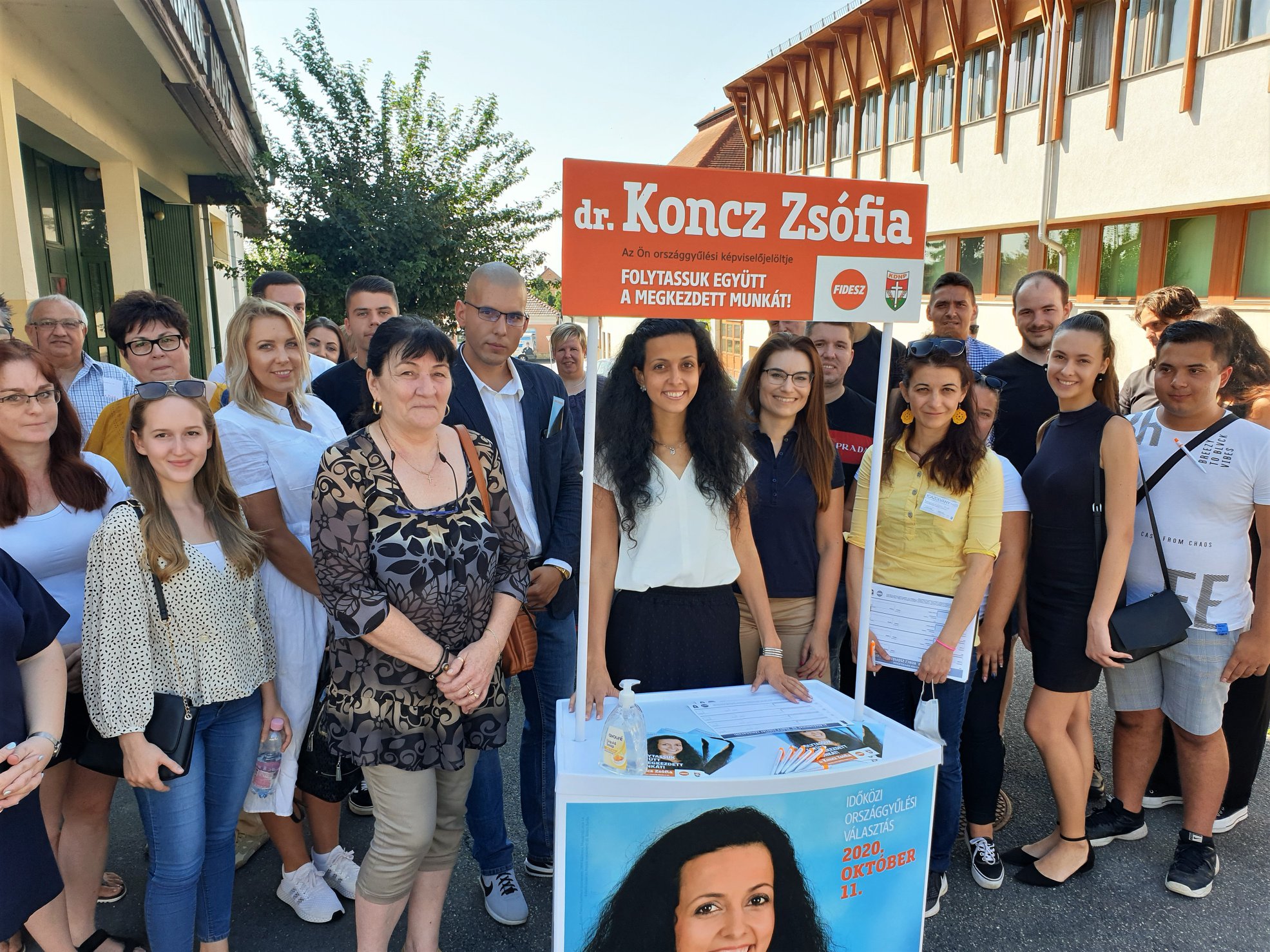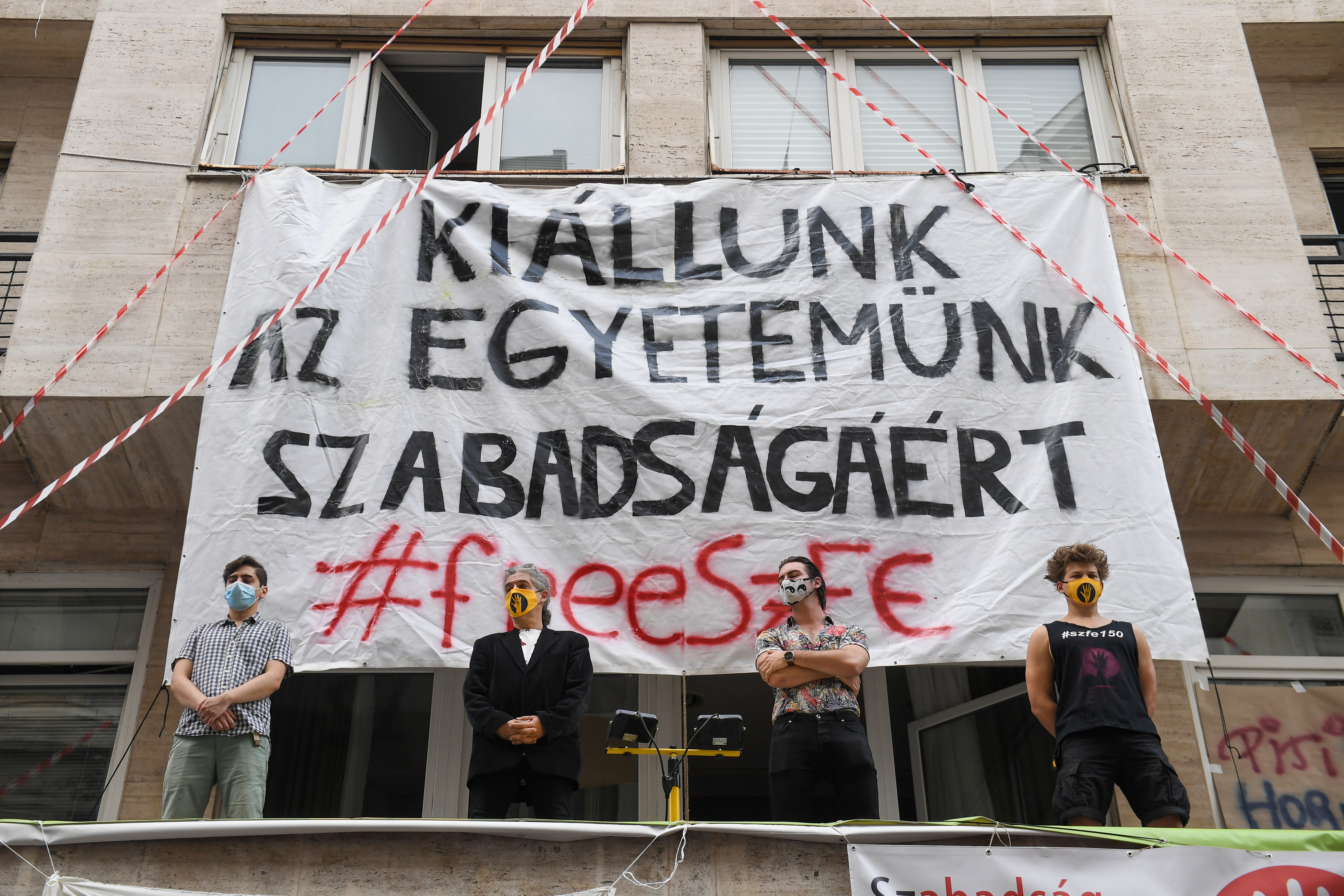Former military colonel shuts down internet at arts university campus amid ongoing student occupation
- Stay updated on the latest news from Hungary by signing up for the free InsightHungary newsletter:
The internet connection in two campus buildings of the University of Theatre and Film Arts (SzFE) in Budapest was cut on Tuesday as students, who have occupied the university since late August, held a student forum.
The move came after the university's newly-appointed chancellor, former military Colonel Gábor Szarka, issued a statement declaring that the university's government-appointed leadership considers the occupation and ongoing teachers' strike "finished", and threatened to cut off infrastructural and financial resources to the campus. On Wednesday, Szarka said in an interview that he personally cut the internet connection to the campus, and that it will remain off between 6 p.m. and 7 a.m. each day.
All students and faculty will be required to sign a statement on whether they are willing to work with the university's new leadership, the statement continues.
In a separate communiqué, Szarka wrote that he has "banned all cooperation with university occupiers and their supporters," and threatened university employees with firing if they do not distance themselves from the protesters. He also prohibited the use of audio and video recording devices on the campus.
"I will go as far as I can to bring an end to this kind of internal anarchy," Szarka said.
SzFE teachers and students consider the chancellor and government-appointed board of directors to be illegitimate, and have demanded the reinstatement of the university's democratically-elected senate and guarantees for its autonomy. The student blockade has not allowed any members of the new leadership to enter the campus buildings since the occupation began on August 31.
Attila Vidnyánszky, the chairman of the new board of directors, said on Tuesday that classes and administrative tasks would be moved to another location if students do not end the blockade.
Students called a protest march for October 23 to begin on the banks of the Danube at Műegyetem Rakpart, the site of a student demonstration which kicked off the Hungarian Revolution of 1956.
"On October 23, 1956, brave university students mobilized for what they believed," the students wrote. "They stood up for the freedom of the individual and the community. Let us remember that we can achieve anything if we act together."
Fidesz retains supermajority with victory in by-election
The governing Fidesz party retained its two-thirds majority in Parliament on Sunday when Zsófia Koncz, Fidesz's candidate in a by-election in Borsod-Abaúj-Zemplén county, won the contentious race against the candidate of the united opposition.
Koncz, 30, who was running for the seat left empty by her father after he died in a motorcycle accident in July, took 50.87 percent of the vote, defeating the opposition candidate László Bíró who received 45.9 percent. Turnout was near 45 percent.

Both Fidesz and the opposition parties campaigned heavily in the region as the governing party sought to maintain its mathematical supermajority in Parliament. The race was viewed as a testing ground for the opposition's strategy of uniting behind a single candidate to run against Fidesz, a method which produced significant gains for the parties in municipal elections last year.
Biró, a member of the right-wing Jobbik party, ran as the joint candidate of MSZP, Momentum, Democratic Coalition, Dialogue and LMP. Jobbik was unable to nominate Biró as its candidate after Fidesz filed a complaint over an administrative technicality that ultimately reached the Curia, Hungary's highest court.
Biró was criticized for anti-Semitic comments he made on Facebook two years ago, and was denounced by Roma activist Jenő Setét for making anti-Roma remarks. Fidesz officials and pro-government media frequently criticized the liberal opposition parties for supporting Biró in light of his comments. Budapest Mayor Gergely Karácsony, as well as the presidents of Jobbik, Momentum and MSZP campaigned in the district on Biró's behalf.
Following the election, independent MP and anti-corruption specialist Ákos Hadházy revealed that Biró was implicated in a corruption scheme involving misused EU funds. The revelation angered opposition leaders, and MSZP vice-president Ágnes Kunhalmi said Hadházy was "weakening us against Fidesz." Biró has denied the allegations.
Numerous government ministers and other high-ranking officials campaigned for Koncz, including Justice Minister Judit Varga, minister of family affairs Katalin Novák, Viktor Orbán's chief of staff Gergely Gulyás and Fidesz caucus president Máté Kocsis. Her campaign reportedly spent more than HUF 5 million (€14,000) on Facebook ads alone, exceeding total spending allowed for all campaigning. Opposition politicians supporting Biró also complained that Fidesz gave out sacks of potatoes to voters and held a discount food market in the days before the election.
Koncz was previously vice-president of Fidesz's youth wing Fidelitas, and worked since 2017 at the Hungarian Embassy in Washington, DC.
Hungary passes 1,000 coronavirus deaths as rate of testing remains low
Record-breaking coronavirus deaths were registered on each of the last three days as 29 people lost their lives to the disease on Thursday, a daily record. A total of 1,052 Hungarians have died of coronavirus-related causes since the beginning of the pandemic.
Nearly half of total deaths have come in the last six weeks as new cases, hospitalizations and positive test rates dwarf spring numbers. While Hungary's death rate per 1 million inhabitants remains relatively low when measured from the beginning of the pandemic, more recent figures indicate that the virus is spreading uncontrolled: Hungary has the fourth worst daily rate in Europe behind Czechia, Romania and Spain since September 1, the beginning of the "second wave".
The total number of deaths in Hungary surpassed those in Austria on October 3, and has continued to climb at a sharply higher rate than the neighboring country.
The true number of confirmed cases is likely significantly higher than the official count due to continued low levels of testing. Recommendations by the World Health Organization to keep the rate of positive tests below 5 percent have not been met since September 11, reflecting insufficient testing. The rate of positive tests has moved between 10 and 14 percent since the end of September.
The number of weekly tests has declined since September 20, something epidemiologist Beatrix Oroszi said was likely due to Hungary's testing capacity having reached its limit. The number of confirmed daily cases is no longer a reliable indicator of the spread of the virus since the rate of testing is only capable of discovering 800-1,200 cases per day, she said, adding that wearing masks, social distancing and limiting physical contact are the only options now available for slowing the virus' spread.
But the government has been reluctant to introduce restrictions like banning mass events or introducing distance learning in schools, even as several teachers have died in recent weeks.
Budapest district prohibits construction of permanent housing for homeless
The district council of the Budapest neighborhood of Soroksár passed a resolution on Tuesday prohibiting the construction of a three-unit apartment building meant to provide permanent housing for homeless people.
Construction of the small building would have taken place on an empty lot purchased this year by the From Streets to Homes Association, a housing rights group that assists homeless persons move into permanent housing. The three units would have housed 5-7 people, and the organization took steps to ensure the building fit the district's aesthetic character.
Leaflets distributed in the district by an unknown organization suggested a homeless shelter was being planned for the site, while the Streets to Homes Association's founding mission is to provide permanent housing for the homeless rather than relying on shelters.
The Soroksár district council justified its decision to block new construction in the area surrounding the planned development by referring to a "disturbing effect on the suburban residential environment" which could have "unpredictable health and hygiene consequences”.
Members of the press, as well as Streets to Homes Association founder Vera Kovács and other group representatives, were told by security guards that they could not attend the district council's Tuesday session due to coronavirus concerns. The organization has signalled it would negotiate with the council on the terms of an exchange for the purchased lot, saying it no longer considers it safe for tenants to move into the property "since strong tensions were fomented against our organization."



